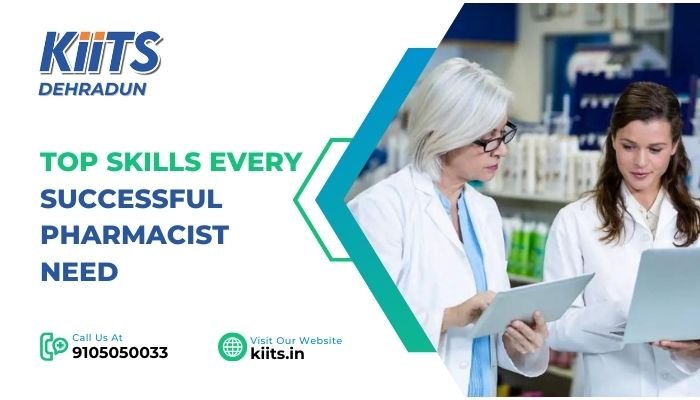What skills are needed in pharmacy?
In order to be productive and advance in the pharmacy field, one must possess pharmacy skills. You can accomplish your personal career goals and be productive at work with these talents. As you continue to practise, you can acquire the knowledge and abilities of a chemist. We go over what pharmaceutical skills are in this article and how to develop them.
How to Develop Your Skills in Pharmacy?
Developing your pharmacy skills is essential to progressing in the pharmacy field. The following advice can help you develop these abilities and become a successful pharmacists:
Locate a Guide
One of the simplest ways to get better is to learn from other people. A mentor who possesses traits and skills you find inspiring might offer helpful criticism. Take inspiration from their work ethic and experiences. To develop your abilities and become a better chemist, own your shortcomings and remain responsive to advice.
Establish objectives and evaluate progress
Establish measurable objectives based on your areas for growth. If you find it difficult to multitask, for example, set daily or weekly goals to improve this ability and monitor your progress. By keeping a journal, you may track the things you did well and the things you found difficult, which will help you concentrate your efforts where they are most required.
Maintain Consistency
In the pharmaceutical industry, where changes occur gradually, consistency is essential. Practicing particular pharmacist skills on a daily basis aids in the development of routines and gradual improvement. Working on your abilities on a regular basis will help you develop excellent habits and improve.
Important Skills for a Pharmacy Career
In order to carry out their jobs efficiently, licenced pharmacist must possess certain critical skills related to pharmacy. With these abilities, chemists can work efficiently and reach their full potential in their positions. While specific job requirements may differ, a successful career in pharmacy always requires a few core talents.
Essential Skills for Pharmacy
Interpersonal and Communication Skills
When working with patients and healthcare providers, excellent communication is essential. Pharmacists must be able to handle a variety of patient personalities with empathy, bargaining, listening, and conflict resolution abilities in addition to explaining medicine usage and any side effects.
Observation of Detail
Pharmacists are required to work with extreme accuracy. Paying close attention to detail guarantees patient safety and reduces mistakes in everything from checking prescriptions to giving the right medication.
The pharmacist needs to possess a few crucial abilities in order to succeed in the
workplace:
Superb Customer Service: Having outstanding customer service abilities is essential. When interacting with patients and co-workers, always project a calm and upbeat image, especially in the face of agitated or impatient clients. Give them your time, attention, and affirmation that they are important.
Drug Therapy Ability: The ability to administer drugs effectively is essential. Inform patients and carers on probable adverse effects, dose adjustments, storage, and other aspects of drugs. Analyse and provide safer alternatives for significant adverse effects while keeping an eye on the situation.
Knowledge of Company Policies: It’s critical to comprehend and abide by company policies. Respect your employer’s policies and procedures at all times.
Proficiency in Pharmacy Services: Set up the pharmacy to offer excellent services, such as medicine delivery, patient counselling, and effective dispensing.
Patient Care: From consultation to medication prescription, give them the finest care possible. Work together with insurance providers and other medical professionals to guarantee excellent patient care.
Communication and Interpersonal Skills

A key component of dealing with patients and healthcare providers is effective communication. In addition to describing medication usage and any side effects, chemists must be able to deal with a range of patient personalities and possess empathy, bargaining, listening, and dispute resolution skills.
Computer Proficiency

To handle inventory, create reports, and update client data, one must be proficient in computer programmes and pharmacy management systems.
Money Management
Financial literacy is essential for pharmacy managers to manage consumer payments, create budgets, and keep track of finances.
Knowledge of administering and delivering medications
- Interpersonal and communication abilities
- Aptitude for organisation
- Skills in providing customer service
- Understanding of medical terminology
- Proficiency with computers
- Collaboration skills
- Paying close attention to details
- Knowledge about insurance companies
Developing Your Pharmacy Knowledge

Locate a Mentor: Learn from an expert in the industry who can offer direction and criticism.
Set Objectives and Evaluate Results: Based on your areas of weakness, set clear, attainable goals and monitor your progress on a regular basis.
Maintain Consistency: To create habits and advance gradually, practise your abilities on a daily basis.
What qualifications are necessary for a licenced pharmacist?
A licenced pharmacist must possess a variety of competencies, such as computer literacy, efficient communication, multitasking, management skills, scientific and mathematical proficiency, and attention to detail. Accuracy, patient safety, and effective pharmacy operations all depend on these abilities.
How can I grow my career in pharmacy ?
Focus on enhancing your essential talents on a regular basis if you want to progress in your pharmaceutical career. Seek for a mentor, establish clear objectives, evaluate your development on a regular basis, and practise your skills consistently. Improving your skills in drug treatment, health care, and customer service can make a big difference in your job opportunities.
Which computer abilities are necessary for a successful pharmacist?
A successful pharmacist should know how to use pharmaceutical management systems and computer programmes. Maintaining correct records and guaranteeing smooth pharmacy operations requires proficiency in data entry, inventory management, and report generation.
What makes multitasking crucial for a pharmacy career?
A career in pharmacy requires the ability to multitask because pharmacists frequently manage several tasks at once, including taking calls, serving customers, verifying the expiration dates of medications, restocking, and updating records. Accurate and timely completion of all activities is ensured by effective multitasking.
What effect does confidentiality have on a licenced pharmacistjob?
Maintaining confidentiality is essential to a licenced pharmacist job. Building confidence and guaranteeing adherence to legal and ethical requirements depend on protecting patient privacy and the security of their medical information. Maintaining anonymity is essential to a successful career in pharmacy.
You may develop your pharmacy skills and grow your career in pharmacy by concentrating on these areas, which will help you establish yourself as a professional pharmacist.








